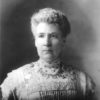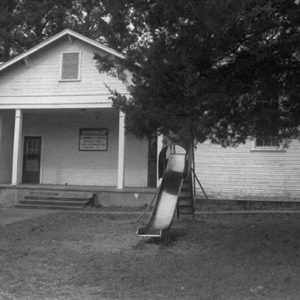calsfoundation@cals.org
Rosenwald School (Delight)
The Rosenwald School, located on Arkansas Highway 26, is a one-story, wood-frame building erected between Delight (Pike County) and Antoine (Pike County) in 1938 by the Works Progress Administration (WPA), a Depression-era public relief program. It was listed on the National Register of Historic Places on September 17, 1990.
Three schools were built in Pike County between 1923 and 1927 with assistance from the Julius Rosenwald Fund to serve the county’s African-American children. The Rosenwald Fund had been created by a Sears, Roebuck and Company executive to help construct educational facilities for minority children in the South; a total of 389 school buildings would be constructed in thirty-five Arkansas counties with assistance from the Rosenwald Fund.
One of those buildings, identified in Rosenwald Fund records as the District No. 24 School, was erected between Delight and Antoine in 1923–1924. The one-teacher school cost $1,495, for which the black community provided $400 and the Rosenwald Fund contributed $400, the remainder coming from the white community and public sources. The school lacked amenities, but it served the area’s black children until it was consumed by fire in February 1938, a blaze that also destroyed an adjacent church. The Arkansas Gazette reported that “the school fire was believed to have been started through carelessness of children in permitting coals to fall from the stove, and the church caught fire from the school.”
Delight Consolidated School District No. 44 applied for WPA funding for a replacement school, and the project to “construct school building in Section 21, Township 8 South, Range 23 West, Pike County, and perform appurtenant work” was approved on April 16, 1938.
Delight’s Pike County Tribune reported on May 13 that “a grant of $4,716 has just been approved … to replace the Rosenwald colored school between this place and Antoine, which was destroyed by fire about three months ago. Work is scheduled to begin on the building immediately.”
The finished building was a two-room, structure clad in novelty siding. It features a stage at one end, and four moveable panels made it possible to turn the interior into one large room if needed. Its exposed rafter tails, including those over the gabled porch, reflect the Craftsman style of architecture.
The Rosenwald School, which served grades one through eight, consolidated with the Piney Grove Elementary School in the mid-1940s, and for the first time a cafeteria building was constructed to provide hot meals for students. Beginning in the 1950–51 school year, Rosenwald students were bused to take classes at Simmons High School in Okolona (Clark County). In the 1965–66 school year, the school was consolidated with the Delight School District, and both black and white students attended Delight High School. The old Rosenwald School was used as a child-care center in the late 1970s and continues to serve in the twenty-first century as a community building.
For additional information:
Albright, Angela. “Rosenwald School.” National Register of Historic Places registration form. On file at Arkansas Historic Preservation Program, Little Rock, Arkansas. Online at http://www.arkansaspreservation.com/National-Register-Listings/PDF/PI0013.nr.pdf (accessed April 23, 2020).
Hope, Holly. An Ambition to be Preferred: New Deal Recovery Efforts and Architecture in Arkansas, 1933–1943. Little Rock: Arkansas Historic Preservation Program, 2006. Online at http://www.arkansaspreservation.com/News-and-Events/publications (accessed April 23, 2020).
Jones, Vernell. “Rosenwald School History.” Typescript manuscript. Pike County Archives and Historical Society, Murfreesboro, Arkansas.
“Negro School and Church Near Murfreesboro Burn.” Arkansas Gazette, February 27, 1938, p. 2.
Rosenwald School Database. Fisk University. http://rosenwald.fisk.edu/ (accessed April 23, 2020).
“Will Rebuild Negro School.” Pike County Tribune, May 13, 1938, p. 3, col. 6.
WPA Central Office Files, 1935–1937, Arkansas (Johnson-Yell Cos.), roll no. 3.
Mark K. Christ
Central Arkansas Library System
 Early Twentieth Century, 1901 through 1940
Early Twentieth Century, 1901 through 1940 Education, Elementary and Secondary
Education, Elementary and Secondary Historic Preservation
Historic Preservation Rosenwald School
Rosenwald School 



Comments
No comments on this entry yet.